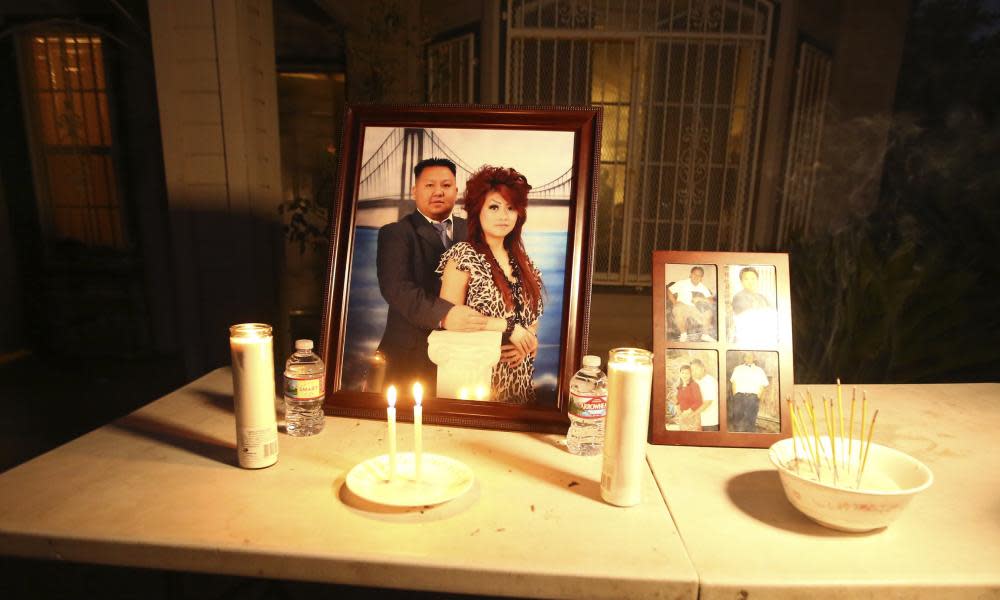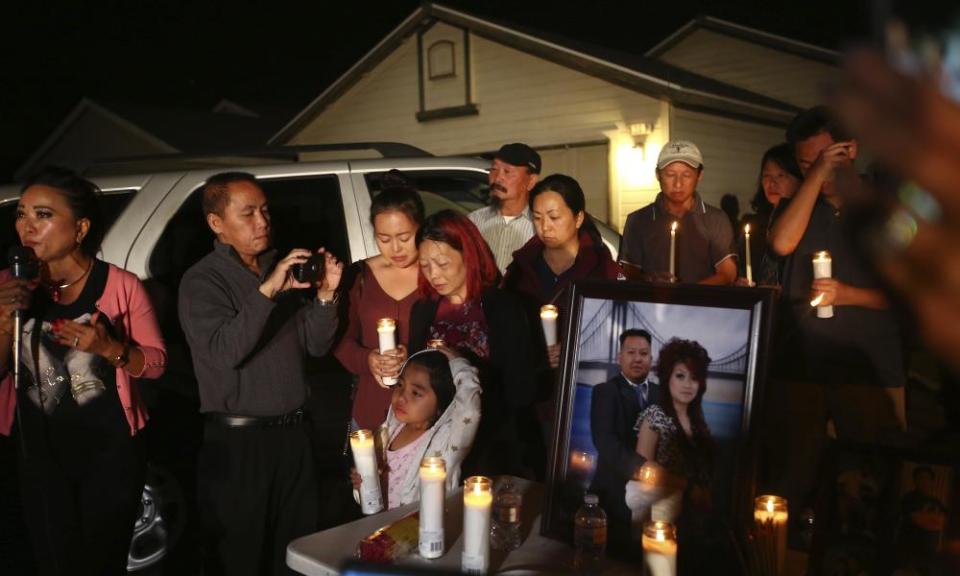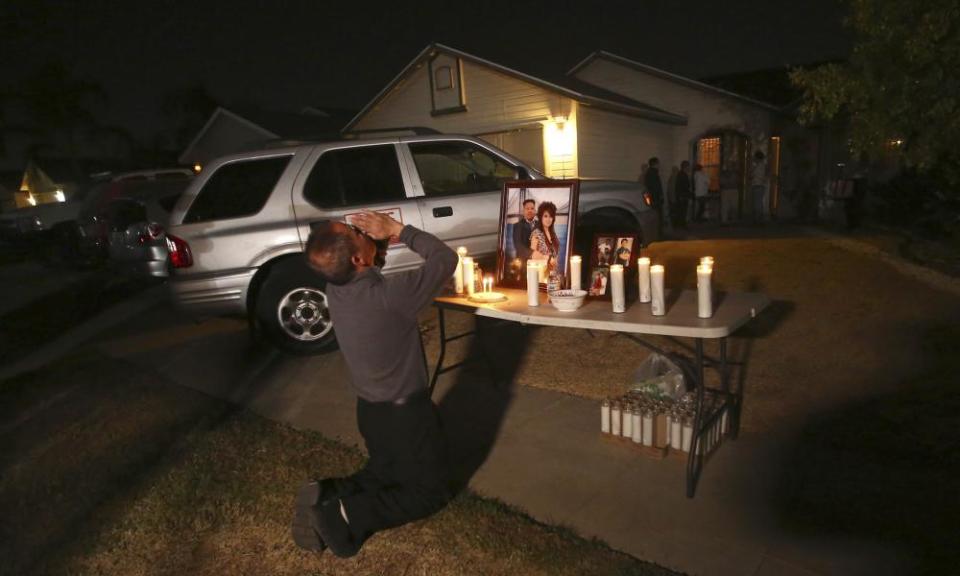'Why did you kill my son?': mass shooting leaves Fresno's Hmong community shattered

Within a year of moving to Fresno, California, Xy Lee had developed a close community of Hmong performers, a globally recognized singing career, and a plan to build his own studio.
On Sunday, it all ended in an instant.
Assailants armed with semiautomatic handguns fired into the backyard where the 23-year-old Lee and dozens of friends were watching a football game – turning a quintessential American pastime into a distinctly American horror in seconds.
Related: Ten dead after California sees three mass shootings in four days
Xy and three other men died: 38-year-old Kou Xiong, 31-year-old Phia Vang and 40-year-old Kalaxang Thao. Six other people were injured.
All of the victims were members of the Central Valley’s Hmong community, a tight-knit group of families who came to California as refugees fleeing war, tragedy and violence in south-east Asia. Xy’s family first arrived in Long Beach when he was 14, but relocated to Fresno last year, in part because Xy was traveling so much to the city to perform.
“He’s pure-hearted. He’s innocent. Why did you kill my son?” Xy’s father Xai Pao Lee said on Thursday, speaking through a translator. Xy’s mother and two siblings clutched tissues and large printed photos of Xy performing. They said they hadn’t slept in days and were struggling to accept that he was gone.

Authorities have released few details on the investigation and the search for the killers. Survivors were unable to identify the suspects. Police said early on they believed there were possibly two gunmen. They’ve claimed the shooting was “targeted”, but have also said it’s unclear if the suspects knew the victims. The Fresno police chief, Andrew Hall, announced the formation of an “Asian gang taskforce”, but also said there was no evidence gang ties played a role in the shooting, The families have insisted their loved ones had no connections to gangs.
‘We escaped war. Now we see this here’
The tragedy has brought national attention to Hmong Americans, and the vibrant Hmong community in Fresno, the Central Valley city 200 miles north of Los Angeles.
The US armed more than 40,000 people, mostly Hmong, to fight in Laos during the war in the 1970s. It began resettling Hmong people in 1975, with a major wave reaching the US in the 1980s. Ultimately, 90% of Hmong refugees ended up in the US, including in California, Minnesota and Wisconsin.
Many people in the community are still struggling with trauma from the war. “People on the outside don’t understand. Our elders are still suffering from some level of PTSD from the Vietnam war,” said Blong Xiong, a 50-year-old former Fresno councilmember, who came to the US as a refugee from Laos when he was five. “A lot of these families escaped the war, were shot at, saw people die in front of them. Now, we’re seeing it happen in this country.”
There are now an estimated 300,000 Hmong Americans, with roughly 34,000 living in Fresno, home to the second largest Hmong community in the country.
Vong Mouanoutoua, a local councilman in Clovis, a neighboring city, said Hmong families were drawn to the Central Valley for farming jobs and more affordable housing.
“Our culture is one in which there is a lot of connectivity,” said Mouanoutoua, explaining that that there are 18 clans among Hmong people, represented by the shared surnames. “The teaching is, you and I had one mom and one dad some time ago, maybe 4,000 generations ago, but we are one.”

There is a special bond within the clans, even if people aren’t related by blood, he said. So when the news broke that people were shot in a “mass casualty” incident at a time when many families gather to celebrate the Hmong new year, panic quickly spread and people posted on Facebook trying to figure out what happened.
“I couldn’t believe this had happened,” said Nou Xiong, a reporter for the local Hmong TV Network, which broadcasts in Fresno and has viewers across the US and in Hmong communities in France, Canada, Australia, Thailand, Vietnam and Laos.
She soon learned the story was worse than she initially thought: The attack took place at her cousin’s home, and 10 people had been shot.
‘I miss him so much’
On Wednesday night, three days after the massacre, dozens of relatives, friends and community members had gathered at the scene of the shooting – the home of Kou Xiong, one of the four victims. The vigils had become a nightly ritual this week, with people lighting candles under an altar with photos of Kou and his wife next to a bowl of rice, some sobbing as they shared a few words.
The home and backyard looked nothing like a crime scene, and the family welcomed everyone inside for dinner, insisting two reporters eat their homemade dishes – beef with ginger and onion, boiled pork, mushrooms and lots of jasmine rice. In the living room, men sat around a table drinking beers. A photo from the Ban Vinai refugee camp in Thailand hung on the wall.
Kou was a chef at a local sushi restaurant, who loved to host guests at his home. Children were in the house during the attack, but none were injured.
“He was hard working. He wanted me to help him open his own sushi restaurant,” said his uncle, Neejkhov Xiong. “Now, I don’t know.”
Neejkhov said Kou’s five-year-old daughter understood that her father was gone but was struggling to process, saying things like: ‘“He left without saying goodbye.’”
During the vigil, the young girl ran around the house handing out water bottles and at one point asked a reporter if she could send a message to her father: “Tell him I love him so much … I miss him so much.”
Kalaxang Thao, another victim, worked at an Asian grocery store. His wife is due to have their third child in January, said his cousin, Leng Thao. Thao’s family had moved to California “in pursuit of the American dream”, the cousin said.
Phia Vang was also a musician and worked at a local lab, earning an income that supported his five younger siblings and parents, his father told the Fresno Bee, adding he didn’t know how the family would survive.
The siblings of Xy Lee said fans across the globe had been reaching out. His recent music video, a ballad, now has millions of views.
“Friends were always asking him to sing, and he never said no,” said Kou Lee, his 31-year-old brother. Xy had taught himself to play guitar and sing when he was eight-years-old and gained popularity in the last several years, Kou said. “Everybody fell in love with him when he sings.”
“It was a natural gift that he had, true God-given talent,” added Kaonor Lee, his 21-year-old sister. Xy planned to open a studio in Fresno so that he could support other songwriters and musicians, the sister said.
Xai, the father, said he didn’t want retribution for his son’s killer, but he wanted the person found and brought to justice – so he could ask him why he did it.
‘The Hmong people are very resilient’
As the families begin to prepare for funerals, many in the Hmong community are desperate to know who was responsible – and what the motive possibly could have been. No one seems to have answers.
Pao Yang, the director of the Fresno Center, a not-for-profit working with the victims’ families, said the comments from the Fresno police chief had been upsetting: “The community is coming together. There are so many good deeds … This is not an Asian gang.”
Still, the lack of information has left people terrified, said Nou Xiong, the reporter: “If people have a backyard, is someone just gonna walk in and shoot?”
Katie Moua, a 25-year-old Hmong organizer in Fresno, said some youth were trying to reassure their parents and grandparents that they weren’t in danger, and that she was worried they were returning to a time when Hmong families felt unsafe or uncomfortable in these neighborhoods.
“We’ve worked so hard to be free. We’ve worked so hard to feel pride in our identity and our city,” she said. “I hope people can still find a way to continue to live how they were living and … find things to celebrate this season.”
Leng Thao, the cousin of one of the victims, said the community would find a way forward: “The Hmong people are very resilient. This tragedy has not weakened us, but actually strengthened us … and reinforced those bonds.”
Standing in the cold outside the home where his son Kou was killed, Cha Lee Xiong struggled to find the words to thank the community.
“I’m hoping this mass killing will be the last one,” he said, adding that he wanted to send a message to people outside of the Hmong community: “If it happens to your family, I will be there to support you.”

